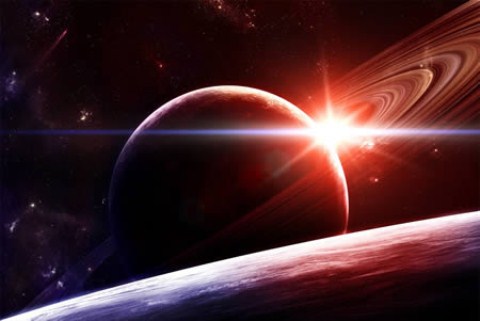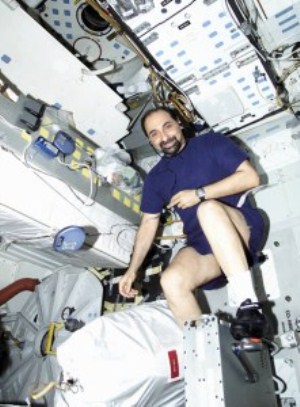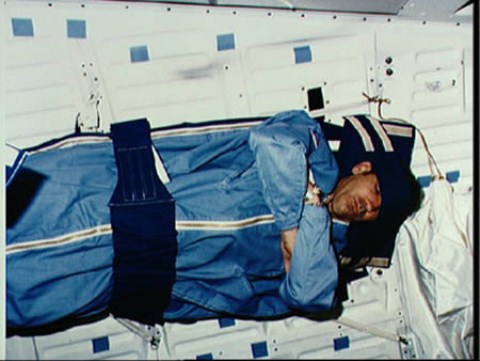Little things to know about astronauts
Life outside the space gives astronauts the amazing things like watching the sun rise 16 times a day, faster and not snoring while sleeping .
Discover the lives of astronauts in the universe
1. One day 15 times the sun rises

Astronauts can see up to 16 times the sun rises in a day.
The sun rises and sets every 90 minutes in the low orbit of the earth. This makes it difficult for astronauts to have a good sleep because the normal day and night cycles are changed.
To adapt to that, the ISS operating station has set up a new timetable for earth-based astronauts.
The clock for space ships is calibrated in GMT, to help astronauts adapt to this new timetable, the cruise control station sends wake-up calls to carry out tasks.
These are usually songs requested by astronauts or their family members. In addition, they are awakened by the alarm system on the spacecraft.
2. You will be faster

Higher but also more back and nerve diseases
Unaffected by the gravity of the earth, your spine will expand and help you grow faster, usually between 5 and 8 cm.
However, increasing the height also gives you some trouble, such as back pain or neuralgia.
3. You will have less snoring while sleeping

Gravity makes astronauts less snoring
A 2001 study demonstrated that astronauts, though snoring while sleeping on Earth, would be quiet when sleeping on space ships.
The reason is that gravity plays a decisive role in stopping breathing, slow breathing and snoring. Although it is still possible for you to snore while sleeping in space according to some NASA records, the effect of zero gravity reduces snoring while sleeping.
4. Some water must be added to the food

Salt and pepper must turn into liquid
In space, salt and pepper can only be liquid because astronauts cannot sprinkle them on food.
In a weightless state that is not "liquefied" , the above spices can be dangerous because of sealing the vents that contaminate the devices and can stick to astronauts' eyes.
5. The record on space is 438 days

Polyakov astronauts were on station 438 days.
This record is kept by the Russian astronaut, Polyakov . In 1995, he was on the MIR space station for 14 months (438) days to do the task.
6. There are three astronauts who died in space

Survivors from Soyuz crew 11.
Of the 439 astronauts that were flown into space as of November 2004, only 11 people died from accidents during training and 18 died from accidents during the flight. Of those 18, the flight team SOYUZ 11, was killed in space in 1971.
The crew included Georgi Dobrovolski, Viktor Patsayev and Vladislav Vlolkov, who were killed after leaving Salyut 1 space station after 3 weeks of missions.
The van of their spaceship crashed when the service module was split. This is only discovered when the rescue team comes here.
7. Most astronauts encounter space syndrome

Nausea, headache, poor concentration are common diseases in astronauts.
Because the environment has no gravity , signs of the vestibular system and pressure receptors are often misleading naturally.
This effect leads to disorientation and disorientation : many astronauts often find themselves feeling upside down, or find it difficult to feel the position of their arms and legs.
These disorders are the causes of Spatial Adaptation Syndrome . An astronaut described humorously on the syndrome as an exciting throw, causing poor headaches and concentration or nausea symptoms. These expressions will disappear after a few days when astronauts adapt to the ground.
8. Difficulty when returning to Earth

Scientists often forget that they are no longer in the space of the spacecraft.
When astronauts return to Earth, their reintegration is as difficult as when they first went into space. This stage sometimes takes a lot of time.
According to the Russian Space Center, for months after returning to the ground, astronauts occasionally put cup or something between the space and then dropped it.
The result is not the same as on a spaceship, the objects break up, not hover
9. Cosmic radiation

Cosmic radiation may cause cataracts.
Journey in space, astronauts witnessed scenes that people have never seen. It may be the breathtaking spectacle of the disc of the blue light of the Earth in contrast to the blackness of space, or the invisible side of the Moon.
They also saw light rays inside their eyeballs. Astronauts from Skylab, Shuttle, Mir and ISS space stations reported observations of the lightning.
These experiences are the radioactivity of space that ripples their eyes like subatomic bullets. When the bullet goes to the retina, it creates a false signal that makes the brain interpret as a ray of light.
In fact, the experience is not good for the eyes at all. At least 39 astronauts get cataracts when they are shot by lightning.
10. Use foam to bathe

Each astronaut has his own personal hygiene kit.
Except for the Skylab space station and Mir's equipped with a tub with a faucet, most astronauts use foam baths and towels or damp towels. This helps reduce water consumption.
Everyone has a separate toilet set that includes a brush, toothpaste, shampoo, razor and other basic hygiene items.
11. Costumes

Astronaut's outfit weighs nearly 130kg and takes 40 minutes to wear. Astronauts can't hurry to wear clothes and run to work like we do.
12. Exercise every day

In a weightless environment, the heart does not have to work hard to transmit blood throughout the body. As a result, the heart will beat slower and weaker, so astronauts must exercise every day to help the heart stay healthy.
13. It's talking with radio waves

You can scream in the universe no one hears. The sound is not transmitted in aerospace due to the absence of air. Astronauts must communicate with each other by radio waves.
- Printer 'fiction' for astronauts
- Researching 3D printers can print things for astronauts from their own ... feces
- Knowing that being an astronaut is difficult, but no one thinks it is so hard
- Little things tear up when living in the universe
- The US spends $ 55 million on NASA to promote the creation of space for astronauts
- Astronauts need to eat a lot of fish
- How do astronauts eat when things hang on?
- Astronauts welcome the new year at the international space station
- America revealed a new costume model for astronauts
- How long can man live in the universe?
- Astronauts are allowed to drink alcohol on the universe?
- When astronauts fly into space, astronauts will be thinner
 Van Allen's belt and evidence that the Apollo 11 mission to the Moon was myth
Van Allen's belt and evidence that the Apollo 11 mission to the Moon was myth The levels of civilization in the universe (Kardashev scale)
The levels of civilization in the universe (Kardashev scale) Today Mars, the sun and the Earth are aligned
Today Mars, the sun and the Earth are aligned The Amazon owner announced a secret plan to build a space base for thousands of people
The Amazon owner announced a secret plan to build a space base for thousands of people